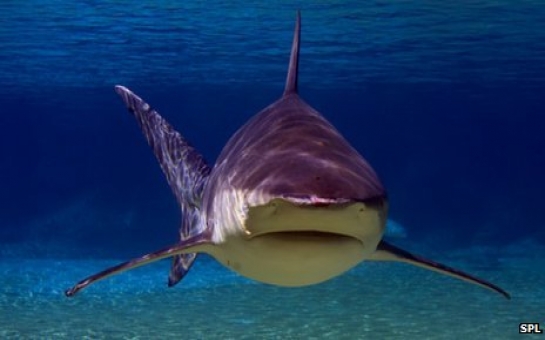In the last week of August, the body of Tiago Jose de Oliveira da Silva, 18, was found in the sea just south of Recife, in north-eastern Brazil. An autopsy ruled he had been killed by sharks.His death was the 56th shark attack in Recife in 20 years. What is so shocking about Recife's attacks is that so many of them are fatal - 21 of the 56, a death rate of about 37%. This is much higher than the worldwide shark attack fatality rate, which is currently about 16%, according to Florida State Museum of Natural History .According to Dr Rosangela Lessa of the Federal Rural University of Pernambuco (UFRPE), and president of the state's team trying to reduce shark attacks, the blame lies with recent environmental disturbances in the region. It is also because there are lots of beachgoers - and lots of aggressive sharks - sharing the water.Scientists believe most of these attacks are committed by two species - bull sharks and tiger sharks - but forensic evidence has only been able to confirm the species responsible in eight of these attacks.Bull sharks are considered the be one of the most dangerous shark species, with many proven attacks against man.There are almost two million people in Recife and surrounding areas, and there are many beaches conveniently located in and around the city. But, some 700 metres off the coast lies a deep trench running parallel to the beaches near the city.Sharks use this trench as a migratory route and emerge from it to hunt in the shallows.It is Recife's Port Suape, though, that many see as the biggest cause of the recent attacks. Located 20km (12 miles) south of Boa Viagem Beach, where most of the attacks have occurred, the port has been the cause of much disturbance for marine life along the coast and the nearby estuaries.Construction began in the late 1970s, but it was not until 1992 that it began to attract significant shipping traffic. Before 1992, Recife had no more shark attacks than any other beach in Brazil, but the change was immediate and dramatic.To build the port, estuaries were dredged and long docks built, protruding out into the ocean. This is especially a problem for bull sharks, who generally stay close to land and are able to tolerate fresh water (they are regularly encountered in rivers such as the Amazon).Much of their lifecycle is dependent on coastal estuaries and the building of Suape is thought to have disrupted breeding and hunting habits.Polluted waterFor the migratory tiger shark, the port presents a different problem. Tiger sharks often travel long distances and often follow in the wake of ships, attracted by the rubbish thrown overboard.Port Suape's increasing ship traffic may be attracting these sharks into coastal waters, according to Dr Francisco Marcante Santana, a professor at UFRPE and president of a Recife-based Brazilian Society for Elasmobranchology Research, or SBEEL. "Sharks are actually drawn towards polluted water. They are expert hunters but they're not above scavenging through the sewage for a meal."Only 35% of Recife's sewage is treated, and that rate drops as low as 6% in some of the city's surrounding municipalities, according to the Instituto Trata Brasil, a water and sewage monitoring group. The rest flows directly into the rivers and estuaries around the city.The Suape Port Industrial Complex denies it is at fault. Spokeswoman Danielle Lima says the environmental impact studies that implicate the port only use circumstantial evidence. "Not one study definitively proves the link between the port and the shark attacks," she says.Lifeguards on Boa Viagem receive extra training to respond to shark attacks and are equipped with a device called the SharkShield. It emits an electric pulse through the water to shock the sharks' highly sensitive electrical receptors, which they use to find prey. Lifeguard Cabo Aquino, 38, says: "If a shark really wants to attack, this won't stop him. But if he's nearby and considering attacking, he won't want to come any closer."Boa Viagem is so dangerous that lifeguards no longer train on the beach itself. "We used to swim 40m out into the water. Now we swim laps in a pool."Lifeguard Edmir Nicacio Lopes Junior was just steps away when a woman was attacked. "I was walking down the beach and saw her wading in about one metre (three feet) of water. In our training, we are told that at that depth people are not at risk. So I kept walking."Seconds later, a bull shark attacked the woman, biting off her right buttock and half of her left buttock. Fortunately, the attack happened directly opposite a hospital so she was treated immediately and survived.The next day, another person was attacked on the same beach. They also survived.After a 1999 attack on surfer Charles Heitor Barroso Pires, the city banned surfing. The 23-year-old surfer's hands were bitten off by a bull shark on Boa Viagem. "I am lucky to be alive. If it had been a tiger shark, I would not be here to tell the story today." Mr Pires is still an avid surfer, but says he will never again enter the water on Boa Viagem.In 2004, the state of Pernambuco formed the Committee for Monitoring Sharks Incidents (Cemit), bringing together lifeguards, university researchers, and environmental NGOs to educate the public about shark attacks and threats to endangered shark species.Artificial reefCemit conducts a catch-and-release program to remove the sharks from beaches. So far it has caught 81 sharks, tagged them with tracking devices, and released them far out to sea. Its GPS data on the sharks tagged shows that after being caught, all tiger sharks have migrated to other regions.To get the sharks further out to sea, Cemit sank three boats on the far side of the ocean trench to create an artificial reef in 2006. This was to attract fish to congregate around the boats so sharks coming out of the trench to hunt would move away from the beach.Cemit divers have found that the artificial reef is attracting fish and sharks. But local fisherman Birata Josue Rodrigues, 59, still only ever sees sharks closer to shore, on the coastal side of the ocean trench.Mr Rodriguez and his son Carlos Wilson, 19, push their brightly painted jangadeiro fishing boat off Boa Viagem at dawn every morning through these shark-infested waters, but say they do not fear the sharks."Sharks only like surfers and tourists," they laugh. Small-scale fishing like theirs and industrial-scale shrimping are also thought to be attracting sharks into Recife's waters because of the waste thrown overboard.Many hoped Recife's shark problem would simply go away. But last month's death showed that it will not be that easy. Dr Lessa says: "Now nobody thinks this problem is going to just end... the root causes remain."The Brazilian government is now considering building another large port just north of Recife, near the town of Goiana. Whether the waters become even more dangerous to swim in remains to be seen.(BBC)Bakudaily.az
The beautiful Brazilian beaches plagued by shark attacks
World
13:50 | 24.06.2014

The beautiful Brazilian beaches plagued by shark attacks
Brazil's northeast coast boasts warm waters and beautiful beaches. But the coastal waters off Recife are home to many aggressive sharks, and in the last 20 years a spate of attacks has made this one of the most dangerous places in the world to swim. Rob Sawers reports.
Follow us !










